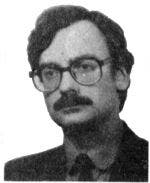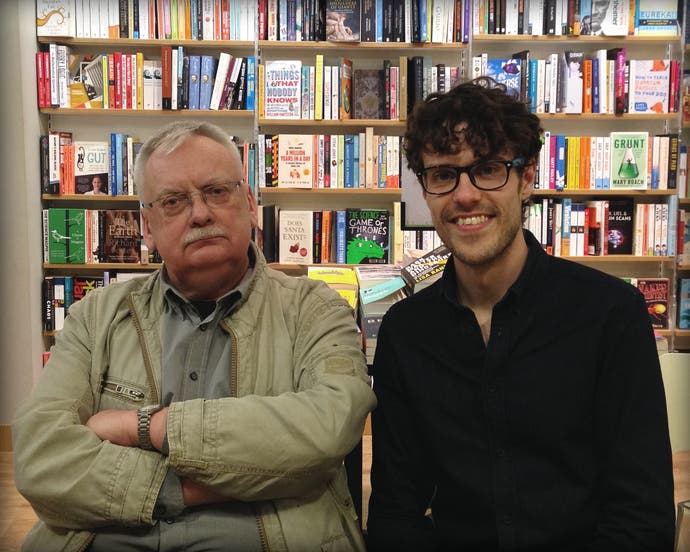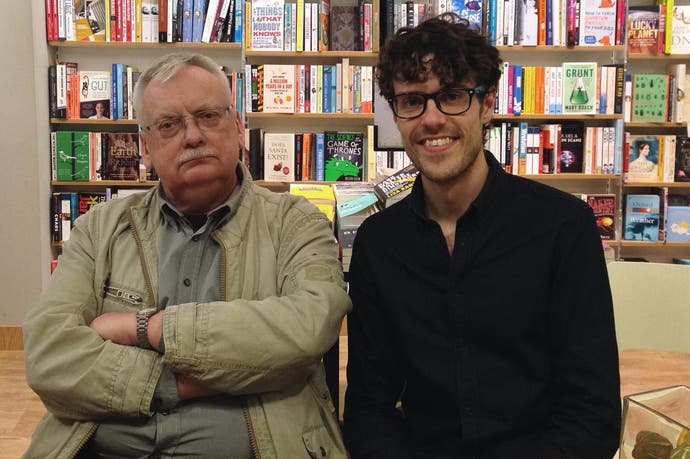Meeting Andrzej Sapkowski, the writer who created The Witcher
Does he really hate games?
Andrzej Sapkowski has something of a reputation.
To start with, he's a big deal. He invented Geralt, witchers, Triss, Ciri, the whole thing - it all came out of his head. He has won awards and his work is revered, especially in Poland. More than once I've heard him described as the Polish Tolkien. But I've also heard he can be difficult - and I'm on my way to meet him.
"Good luck Robert. He is not the most pleasant person in the world…" one Twitter follower warns. "Good luck, you're gonna need it," says another.
Sapkowski seems to particularly dislike video games, yet try as he may he cannot escape them. Everywhere he goes, people ask about The Witcher games made by CD Projekt Red. Does he play them? Do they inspire him? Is he eternally grateful for the exposure? It's like prodding a hornets' nest. It doesn't bode terribly well for me.
I mill around the true crime section of a Birmingham Waterstones when a loud Polish voice at a table behind me tells me that Andrzej Sapkowski has arrived.
It all began in 1985. Sapkowski was a travelling salesman dealing in furs. He was 38 years old, had a degree in economics and spoke many languages. Writing was not his first shot at life. But he adored fantasy, devouring books as he travelled. Each year at a fur fair in Montreal his first stop would be a bookshop. "Is there a new [Chronicles of] Amber by Roger Zelazny?" he would breathlessly ask. "Yes? Good! Good!" But why he entered a short story competition in Polish magazine Fantastyka that year he cannot say.

Sapkowski knew what he wanted to do: he wanted to really shake the Polish public. But he only had 30 pages to do it. "I wrote love letters longer!" he tells me now, chuckling. "You can't imagine how popular I was, how I scored. Believe me - they love words. But it was very hard for me to be confined into these 30 pages."
Classic fantasy wouldn't fit. "What to do?" A fairytale, he decided. Reimagine a Polish fairytale, make it real. Take the Polish story of the poor cobbler who kills a dragon, for example. The cobbler achieves what warriors could not by tricking the dragon into eating a lamb stuffed with sulphur. The dragon drinks so much water from the nearby river in an effort to calm the raging fire in its belly, he pops.
"It is a lie," says Sapkowski. "Poor cobblers make good shoes, they don't kill monsters. Soldiers and knights? They are idiots generally. And priests want only the money and f***ing adolescents. So who's killing monsters? Professionals. You don't call poor cobblers' apprentices: you call for professionals. So then I invented the professional."
He called his story Wiedzmin, a title later translated as The Witcher, and sent it to Fantastyka magazine. "I waited one year for the results," he says. "I said, 'I lost, I lost, nobody noticed my story, my story was considered bad. What to do?'" But he hadn't lost, Wiedzmin had nearly won - and would have, he believes, had fantasy a better reputation at the time.
"Back then, in Poland, fantasy was considered something for stupid children who couldn't even masturbate properly," he assures me. "So they said, 'This story is the best but it is fantasy so let's give him the third award.' But jurors are jurors, they are mostly stupid, they are mostly biased. But the public… The impact of The Witcher on the Polish fandom was tremendous, absolutely tremendous. And everybody said, 'More! More! More! More!'
"I never intended it, believe me. I never intended to write the second story. But after this acclaim, this huge approval, what to do? I must do it! Fans are demanding; where there's a demand there must be a supply."
He wrote more short stories - "fix-ups" as he describes them - which were collected and published in books Sword of Destiny (1992) and The Last Wish (1993). Support swelled, so Sapkowski decided to try something unprecedented. "Well Polish fandom, Polish market and the Polish reader merits something like a big fantasy saga," he said to himself. "Why not a Polish author writing a fantasy saga?"
Everybody laughed. "Everybody," he says. They didn't believe a publisher would put a Polish surname on a fantasy novel and expect it to sell. But SuperNowa did, and in 1994, Blood of Elves, the first book in the Witcher Saga, was released.
Sapkowski, not wishing anyone wait more than a year for a new story (he still remembers how disappointed he was one year in Montreal when the bookshop had no new Zelazny for him), then turned out a new novel annually like clockwork. In 1999, the Witcher Saga was complete. If only George R R Martin wrote as quickly! "Do you know I know him personally?" Sapkowski replies. "We are friends. We know each other. We drink unbelievable quantities of beer."
Sapkowski and his Witcher Saga were famous years before CD Projekt had anything to do with it. Indeed, CD Projekt wasn't even the first to try to make a Witcher game. Adrian Chmielarz (Bulletstorm, The Vanishing of Ethan Carter) and studio Metropolis have that honour. I've spoken at length to Chmielarz about 'The Witcher game that never was' before. The game got as far as a publisher and screenshots but was too ambitious and quietly died.
CD Projekt came sniffing around in the early 2000s, another history I've written in detail before. Sapkowski doesn't remember how the conversation went but he remembers agreeing to the game. "Well they brought a big bag of money!" he says. It was the same reason he said yes to Chmielarz. "What I expect from an adaptation: a big bag of money. That is all."
Sapkowski wouldn't say how much money changed hands. Chmielarz, for his part, mentioned paying "good money for Poland in 1997"; and CD Projekt co-founder Marcin Iwinski mentioned an offer that "wasn't a huge amount of money".
Sapkowski continues: "I agreed they would write a completely new story using my characters, my ontology of this crazy world. But they would create completely new stories. I said, 'Why not? Please, please, show how good you are.'"
Simply, he didn't think it would amount to much. He thought games were stupid, had done ever since shooting Martians on an old console plugged into a TV. "OK let's play cards or let's drink vodka," he said back then, "but killing Martians is stupid. And my standpoint stands: it is stupid."
So he left CD Projekt Red to it. Didn't visit, wasn't consulted, didn't care. He was Andrzej Sapkowski, who were they? "People ask me, they say, 'The games helped you?' I say, 'Yes, to the same extent I helped the games.' It was not so that the games promote me: I promoted the games with my name and characters."
When The Witcher 1 came out in 2007, things began to change. Book publishers saw it as a way of reaching a new audience and so republished the series with game-related images and blurbs. It muddied the waters, making the distinction between game and author less clear. Not a problem in Poland, where Sapkowski was a household name, but to English audiences, where he wasn't published until 2008... "It was f***ing bad for me," he says.
As CD Projekt Red's star rose with each game released, the problem worsened. Take a look at the covers of the English books now and see for yourself. You can imagine why someone would mistakenly ask Sapkowski if he was the guy writing books about the games. "It happened," he says. "It happened. I can remember my reaction: I know many bad words and I used all of them, in many languages.
"In 20 years," he says, "somebody will ask, 'Witcher, the game - and who's the author?" No one will know. "Somebody," they'll say. I get the impression it is his greatest fear.
You can understand his frustration and you can understand the confusion. But isn't it all water under the bridge compared to the money he has made from Witcher game sales? Well no, because - and herein lies his constant source of aggravation - he gets nothing.
"I was stupid enough to sell them rights to the whole bunch," he says. "They offered me a percentage of their profits. I said, 'No, there will be no profit at all - give me all my money right now! The whole amount.' It was stupid. I was stupid enough to leave everything in their hands because I didn't believe in their success. But who could foresee their success? I couldn't."
He doesn't begrudge CD Projekt Red's accomplishments all the same. In many ways he couldn't have asked for a better studio. Credit where credit is due. "The game is made very well," he says, "and they merit all of the beneficiaries they get from it. They merit it. The game is very good, well done, well done."
He is not above signing a Witcher game too, should you present it, and people have. "I do it," he says. "Because first of all, when people come to sign, I consider them fans, so if they come and present me the game to sign, I cannot say no to that because it would be very impolite. Stand in a long queue, bring the game, what can I say? 'Please go away, I will not sign it'? It will be very impolite."
Who knows? In the hungry silence following The Witcher 3: Wild Hunt, many new fans may discover Sapkowski's work, and his name may muscle its way back to being head of the table. But the irony of Sapkowski being in Waterstones in Birmingham on a Friday evening, playing to a crowd of a couple dozen, launching an English translation of a book he wrote 18 years ago - all while The Witcher world he invented has never been globally more popular - is not lost on me.

In many ways he lives up to his reputation then, but in other ways he surprises me too. Contrary to popular belief he claims actually not to hate video games at all. "It is not that I don't like them, that I despise them," he says. Hang on, didn't you just call games "stupid"? "I just don't play them! But I have nothing against games, I have nothing against gamers. Nothing."
He's also more entertaining than I expected, boisterous as well as belligerent. He tells jokes like he's told them a million times before, but still he tells them. He wants to entertain, as I suppose a storyteller should, and just as humour runs like a rich vein through his work - and consequently through the games - so too does humour characterise him in person. Many of his comments look so harsh on paper because they're divorced from the way in which he delivers them, with a kind of naughty theatricality; a contrarian courting controversy, if you like. There are even moments where, dare I say it, he borders on friendly.
"When I invented The Witcher and sold my first novel to the public, I was 38. Right now I am 69. All these emotions… I'm not a juvenile any more," he says, "I can judge the emotion. I can say, 'Yes, I merit it, it is justified.' It does not give me the right to go the Vatican and declare myself a saint."
Looking ahead, there is a Witcher film planned for global release this year, although details are still thin on the ground. Sapkowski suggests he knows the name of an actor attached to it, presumably in a major role - maybe Geralt - though he will say no more.
There is also another Witcher novel to be translated into English: the standalone story Season of Storms, released 2013 in Poland. It follows that some of Sapkowski's other works, particularly the acclaimed Hussite Trilogy, may make it into English at some point too.
And maybe, just maybe, Andrzej Sapkowski has another Witcher story to tell. "Yes, why not?" he says. "I will [write another one], and I will do it."
"You will?" I ask.
"Absolutely."

